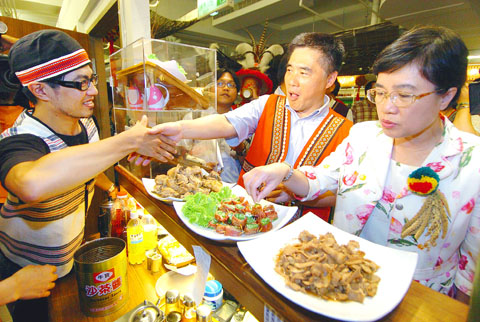Offering a rich blend of innovation, tradition, creativity and originality, a market in Taipei featuring Aboriginal gourmet, farm produce, millet wine, handicrafts and other items was inaugurated yesterday.
The Naruwan Indigenous Peoples’ Market is located not far from Longshan Temple (龍山寺), a popular tourist attraction in Taipei City’s Wanhua District.
Although the market only has 10 shops at the moment, one tour is enough to showcase the rich culture and creativity of Aborigines.

PHOTO: LIAO CHEN-HUEI, TAIPEI TIMES
“When you come here, don’t just shop,” Taipei Mayor Hau Lung-bin (郝龍斌) told a crowd of Taiwanese and foreigners during the inaugural ceremony yesterday afternoon. “Rather, you should try to understand the stories behind these vendors and their culture.”
“There are people who came to Taipei decades ago selling things or serving food on the side of the street — they finally have a storefront. There is a single mother who was struggling to raise her kids and there is a husband who is working to feed his cancer-stricken wife because he remembers the vow he made in church,” he said.
Tseng Chun-yu (曾春玉) is that single mother.
An Aborigine of the Amis tribe, Tseng has had several jobs in the past 20 years since she moved to Taipei from her hometown in Hualien.
She now runs a small coffee and juice bar with her brother and her brother’s two daughters.
“Coffee and juice may not be anything special, but all the fruits I use are grown in Aboriginal areas,” Tseng said. “The coffee beans that I use are also from Aboriginal townships.”
The Haliwan coffee comes from Taitung, the Makutu is from Pingtung and the Pangcah is from Hualien.
“I make very good Pangcah coffee — you have to try it,” Tseng said, smiling.
Next door, an Atayal cook prepares stir-fried wild boar “a l’Atayal” and egg pancake with makau — a spice often used by the Atayal.
Further down is a small Bunun food stand, an Aboriginal handicraft store that offers do-it-yourself courses, a shop selling “sparkling millet wine,” a shop offering organic vegetables and fruit grown by Aborigines, and high-mountain tea from Alishan (阿里山).

Taiwan is to commence mass production of the Tien Kung (天弓, “Sky Bow”) III, IV and V missiles by the second quarter of this year if the legislature approves the government’s NT$1.25 trillion (US$39.78 billion) special defense budget, an official said yesterday. Commenting on condition of anonymity, a defense official with knowledge of the matter said that the advanced systems are expected to provide crucial capabilities against ballistic and cruise missiles for the proposed “T-Dome,” an advanced, multi-layered air defense network. The Tien Kung III is an air defense missile with a maximum interception altitude of 35km. The Tien Kung IV and V

The disruption of 941 flights in and out of Taiwan due to China’s large-scale military exercises was no accident, but rather the result of a “quasi-blockade” used to simulate creating the air and sea routes needed for an amphibious landing, a military expert said. The disruptions occurred on Tuesday and lasted about 10 hours as China conducted live-fire drills in the Taiwan Strait. The Civil Aviation Administration (CAA) said the exercises affected 857 international flights and 84 domestic flights, affecting more than 100,000 travelers. Su Tzu-yun (蘇紫雲), a research fellow at the government-sponsored Institute for National Defense and Security Research, said the air

Taiwan lacks effective and cost-efficient armaments to intercept rockets, making the planned “T-Dome” interception system necessary, two experts said on Tuesday. The concerns were raised after China’s military fired two waves of rockets during live-fire drills around Taiwan on Tuesday, part of two-day exercises code-named “Justice Mission 2025.” The first wave involved 17 rockets launched at 9am from Pingtan in China’s Fujian Province, according to Lieutenant General Hsieh Jih-sheng (謝日升) of the Office of the Deputy Chief of the General Staff for Intelligence at the Ministry of National Defense. Those rockets landed 70 nautical miles (129.6km) northeast of Keelung without flying over Taiwan,

A strong continental cold air mass is to bring pollutants to Taiwan from tomorrow, the Ministry of Environment said today, as it issued an “orange” air quality alert for most of the country. All of Taiwan except for Hualien and Taitung counties is to be under an “orange” air quality alert tomorrow, indicating air quality that is unhealthy for sensitive groups. In China, areas from Shandong to Shanghai have been enveloped in haze since Saturday, the ministry said in a news release. Yesterday, hourly concentrations of PM2.5 in these areas ranged from 65 to 160 micrograms per cubic meter (mg/m³), and pollutants were